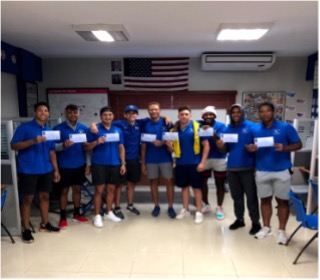Summer Archives
Drew Deister- Kansas City Royals in the Dominican Republic |
Just east of Santo Domingo, Dominican Republic, tucked next to a busy pueblo called Guerra, I spent eight weeks living with seventy-five professional baseball players in the Dominican recruitment academy of the KC Royals. The roster primarily consists of Dominican-born players, with others from Venezuela, Mexico, Nicaragua, Cuba, Aruba, and El Salvador, and competes with other MLB academies in the Dominican Summer League. Signed at sixteen, the players grow up knowing one goal: to reach the “Grandes Ligas” in the U.S.
In recent years, MLB teams have begun to invest in player development outside of the baseball field. Due to oftentimes poor school systems and high dropout rates, the high percentage of players who do not advance struggle to return to normal life, and the low percentage of players who do often experience rough transitions to American culture. Having done virtual work for the Royals’ program in high school, I was excited to design an in-person project that would include adding to the educational curriculum and expanding the “Former Players Program” (FPP), a college scholarship matching program.
 Knowing the need for it, I had chosen to design a comprehensive and innovative Computer Literacy course that would include concepts such as the GSuite and Excel. However, when I noticed that many players still lacked general typing abilities, I quickly realized I would need to pivot, hard. I chose to adapt three different versions of my curriculum, each with custom topics and tools to cater to the group’s experience level. Keeping young professional athletes focused is much harder than it sounds, so I had to push my creative limits to make the concepts as relevant and fun as possible (thank you, Drake). By the end, I saw strong quantitative and qualitative progress with over fifty players.
Knowing the need for it, I had chosen to design a comprehensive and innovative Computer Literacy course that would include concepts such as the GSuite and Excel. However, when I noticed that many players still lacked general typing abilities, I quickly realized I would need to pivot, hard. I chose to adapt three different versions of my curriculum, each with custom topics and tools to cater to the group’s experience level. Keeping young professional athletes focused is much harder than it sounds, so I had to push my creative limits to make the concepts as relevant and fun as possible (thank you, Drake). By the end, I saw strong quantitative and qualitative progress with over fifty players.
Given the Royals’ status as a for-profit organization, a challenge I faced was the sheer amount of time I was allowed to formally teach each day, which especially affected the English classes I also hoped to teach. Pivoting again, I compensated for this by coordinating informal English practice sessions with idle players throughout the day. Through this approach, I was able to see remarkable qualitative progress in both knowledge and confidence.
Regarding the FPP, having already developed relationships with potential target universities before arriving, I had hoped to have several released players enrolled by August. While slow communication and an abundance of red tape lengthened the process slightly, I plan to continue work on it in the coming months.
The knowledge the players gained through my project will empower them to feel more confident and equipped for their respective stages of life. More importantly, the bonds I built with these players will allow me to be an advocate for them long afterwards. At the end of the day, I call many of them great friends, and I know that I learned just as much, if not more, from them as they did from me.
